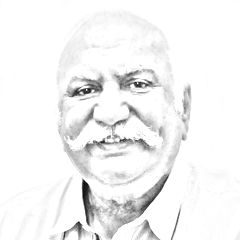Khashoggi criticised the Saudi war on Yemen, writing “The longer this cruel war lasts in Yemen, the more permanent the damage will be. The people of Yemen will be busy fighting poverty, cholera and water scarcity and rebuilding their country. The crown prince [Mohammed bin Salman] must bring an end to the violence.”
In his article, ‘Saudi Arabia’s crown prince must restore dignity to his country – by ending Yemen’s cruel war’, published in September this year by The Washington Post, he wrote, “Saudi Arabia must face the damage from the past three-plus years of war in Yemen. The conflict has soured the kingdom’s relations with the international community, affected regional security dynamics and harmed its reputation in the Islamic world. Saudi Arabia is in a unique position to simultaneously keep Iran out of Yemen and end the war on favorable terms if it changes its role from warmaker to peacemaker. Saudi Arabia could use its clout and leverage within Western circles and empower international institutions and mechanisms to resolve the conflict. However, the window for achieving a resolution to the conflict is rapidly closing…”
Writing on the financial impact due to the war in Yemen, he observed, “Each missile fired by Houthi forces poses both a political and financial burden on the kingdom. The cost of an Iranian missile supplied to the Houthis is uncertain, but one can speculate that each missile does not compare to the cost of a $3million Patriot missile.
This purge comes on the heels of complete intolerance for even mild criticism of Mohammed bin Salman’s reforms, resulting in at least 70 arrests that have, unfortunately, garnered far less attention. Many of us living outside Saudi Arabia will not return home for fear of the same fate
Unexpected costs associated with the conflict in Yemen means Saudi Arabia has increasingly been borrowing funds in international markets without clearly saying what the funds are for. The kingdom has reportedly raised $11 billion in loans from international banks.”
In another article, ‘Saudi Arabia’s crown prince is acting like Putin’, written for the Washington Post in November, 2017 a day after high-profile arrests of businessmen by the Saudi government, Khashoggi wrote, “Saudi royals view themselves as The Party, sharing power and ruling by consent, in an arrangement that is largely opaque. What is absolutely clear after Saturday’s “Night of the Long Knives” is that Crown Prince Muhammad bin Salman is upending this arrangement and centralizing all power within his position as crown prince. This purge comes on the heels of complete intolerance for even mild criticism of Mohammed bin Salman’s reforms, resulting in at least 70 arrests that have, unfortunately, garnered far less attention. Many of us living outside Saudi Arabia will not return home for fear of the same fate. Our families have been targeted instead.”
Commenting on corruption in Saudi Arabia, he explained, “Corruption in Saudi Arabia is quite different from corruption in most other countries, as it is not limited to a “bribe” in return for a contract, or expensive gift for the family member of a government official or prince, or use of a private jet that is charged to the government so a family can go on vacation.
Instead, in Saudi Arabia, senior officials and princes become billionaires as contracts are either enormously inflated or, at worst, a complete mirage. In 2004, Lawrence Wright wrote in the New Yorker about “The Kingdom of Silence” where a massive sewer project in Jeddah was really a series of manhole covers across the city with no actual pipes underneath. I, as the editor of a major paper at the time, can say that we all knew, and we never reported on it.”
“Another example is building an airport in the wrong location simply to benefit the princes who own the land. They received the land for free from the government and then got extravagant compensation for the property.
Last year, during an interview with Bloomberg, Mohammed bin Salman revealed that “there was roughly between 80 to 100 billion dollars of inefficient spending every year, about a quarter of the entire Saudi budget” during the oil boom from 2010 to 2014.”
He further elaborates, “So is the 32-year-old crown prince more like Russia’s Mikhail Gorbachev or Vladimir Putin in this effort? Is he on a path to truly reform the entire system? Or is he simply seizing upon well-known figures to further centralize power in his own hands?
“So while I applaud the public campaign to end corruption, I call on the Saudi media to assume a proactive role in encouraging impartial and transparent investigations as these corruption cases unfold. We Saudis deserve more than the spectacle of royals and officials interred at the Ritz Carlton. We also should have the right to speak about these important and impactful changes – and the many more needed to achieve the crown prince’s vision for our country.
We are a kingdom of silence no longer.”
Khashoggi believed that, “There can be no political reform and democracy in any Arab country without accepting that political Islam is a part of it.” He was sympathetic to Muslim Brotherhood and he suggested that Saudi Arabia should revive Wahabiism and build a closer relationship with Muslim Brotherhood. This was also contradictory to Saudi Arabia’spolicy regarding the ouster of Muslim Brotherhood government in Egypt.
Unfortunately, the rulers in Arab Muslim countries do not tolerate dissent and the concept of freedom of expression is alien to them. The brutal killing of Khashoggi is a glaring example of this manufacturing defect.
The writer is the author of What’s wrong with Pakistan? And can be reached at ayazbabar@gmail.com
Published in Daily Times, October 27th 2018.
